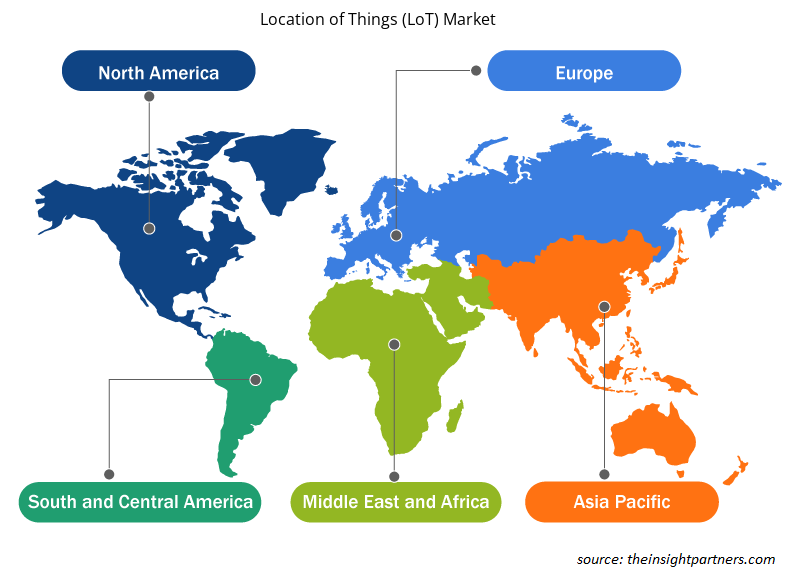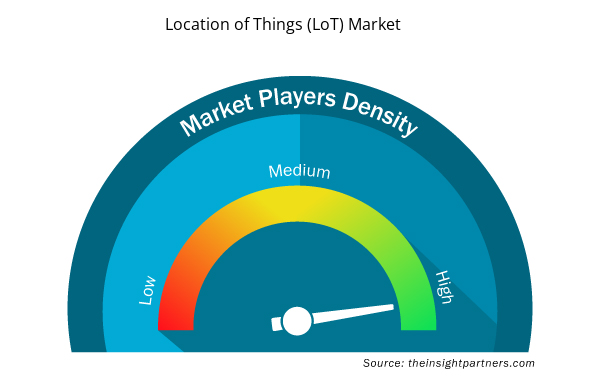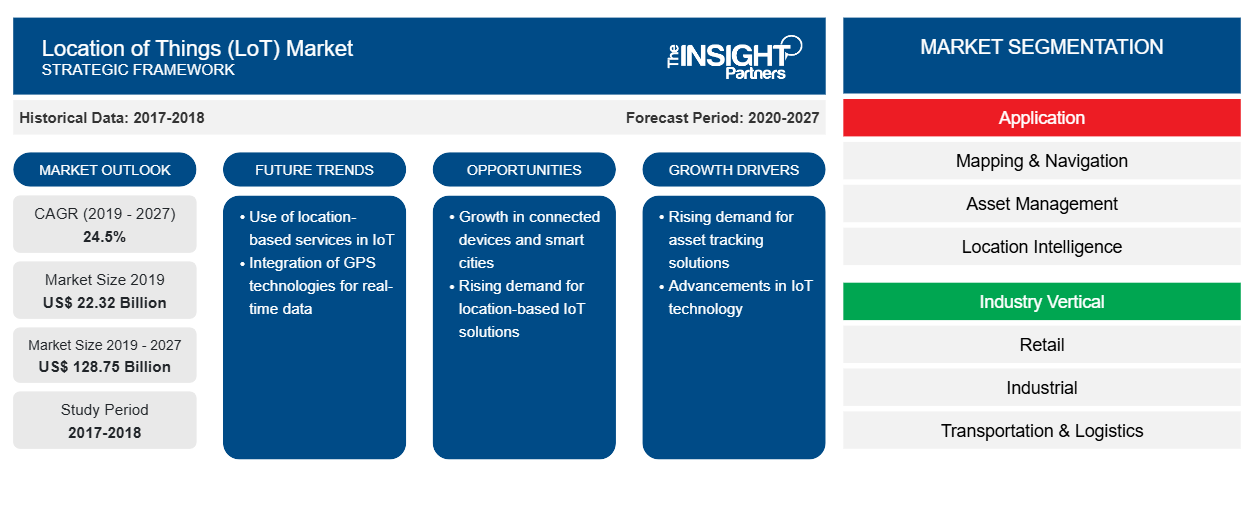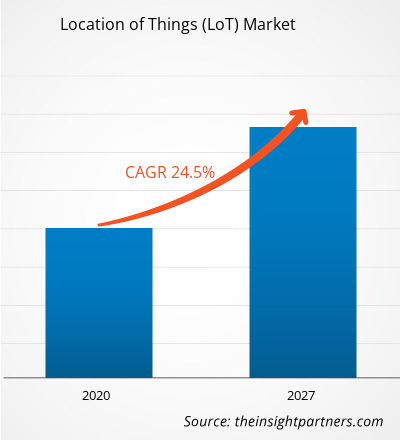بلغت قيمة سوق موقع الأشياء (LoT) 22.32 مليار دولار أمريكي في عام 2019 ومن المتوقع أن تصل إلى 128.75 مليار دولار أمريكي بحلول عام 2027. ومن المتوقع أن ينمو سوق موقع الأشياء (LoT) بمعدل نمو سنوي مركب قدره 24.5٪ خلال الفترة المتوقعة من 2020 إلى 2027.
يشهد سوق البنية التحتية العالمية للإنترنت نموًا مكثفًا فيما يتعلق بالاستثمارات في تقديم تقنيات جديدة ومتقدمة لتحسين الوصول إلى البيانات في الوقت الفعلي. يتكون سوق تحديد موقع الأشياء من بعض اللاعبين الراسخين في جميع أنحاء العالم، والذين يقومون باستثمارات كبيرة أو يتبنون استراتيجيات لتقديم خدمة متقدمة للغاية للمستخدمين. من المتوقع أن يؤدي التمويل الحكومي للبحث والتطوير والشراكات الاستراتيجية بين مقدمي الخدمات ومشغلي الشبكات والهيئات الحكومية إلى حدوث زيادات هائلة في سوق تحديد موقع الأشياء خلال فترة التنبؤ. يستمر الجيل الحالي من شبكات الهاتف المحمول في تغيير تقنية وصول الأشخاص إلى المعلومات والتواصل. يضيف تنفيذ تحديد موقع الأشياء لإجراء أعمال مختلفة المزيد من المعنى للبيانات المتاحة. يؤدي الطلب المتزايد على اتصال إنترنت الأشياء والأمان وحركة البيانات المحمولة وتوسيع تطبيقات الهاتف المحمول إلى دمج بنية السحابة مع شبكات الهاتف المحمول لتعزيز التسليم المرن للخدمات بسرعة عالية. يمكن للمسوقين الاستفادة من البيانات المنتجة، واستشعار طلب المستهلك بناءً على الاتجاهات والأنماط الملحوظة.
تم تقسيم سوق تحديد موقع الأشياء على مستوى العالم إلى قطاعين رئيسيين بما في ذلك التطبيق والقطاع الصناعي. يتم تجزئة قطاع التطبيق بشكل أكبر حسب الخلايا الصغيرة والخلية الكبيرة وغيرها من الخرائط والملاحة وإدارة الأصول واستخبارات الموقع والإعلام والتسويق. في حين يتم تقسيم القطاع الصناعي بشكل أكبر إلى التجزئة والصناعة والنقل والخدمات اللوجستية والحكومة والمرافق والدفاع والإعلام والترفيه والرعاية الصحية وغيرها. من الناحية الجغرافية، تهيمن المناطق المتقدمة بما في ذلك أمريكا الشمالية على سوق تحديد موقع الأشياء حاليًا. ومع ذلك، من المتوقع أن يكون السوق لصالح منطقة آسيا والمحيط الهادئ. يثبت انتشار الهواتف الذكية المتزايد في الاقتصادات النامية في آسيا إلى جانب البنية التحتية للإنترنت سريعة التطور في هذه المناطق أنها المحركات الرئيسية للنمو في تبني تقنية تحديد موقع الأشياء.
قم بتخصيص هذا التقرير ليناسب متطلباتك
ستحصل على تخصيص لأي تقرير - مجانًا - بما في ذلك أجزاء من هذا التقرير، أو تحليل على مستوى الدولة، وحزمة بيانات Excel، بالإضافة إلى الاستفادة من العروض والخصومات الرائعة للشركات الناشئة والجامعات
- احصل على أهم اتجاهات السوق الرئيسية لهذا التقرير.ستتضمن هذه العينة المجانية تحليلاً للبيانات، بدءًا من اتجاهات السوق وحتى التقديرات والتوقعات.
رؤى السوق حول موقع الأشياء (LoT)
انتشار إنترنت الأشياء والأجهزة المتصلة عبر الشبكة والحاجة إلى الاستفادة من البيانات المفيدة
شهد استهلاك البيانات عبر الهاتف المحمول نموًا هائلاً في السنوات القليلة الماضية. وعلى المستوى العالمي، نما معدل حركة البيانات بمعدل سنوي يزيد عن 65٪ على مدى السنوات الخمس الماضية. ومن المتوقع أيضًا أن ينمو معدل حركة البيانات بين عامي 2018 و 2023 بمعدل نمو سنوي مركب يقترب من 40 في المائة. ومع ظهور خدمات وأجهزة أكثر تقدمًا، يحتاج المشغلون إلى رفع مستويات جودة الخدمة المستهدفة لديهم بشكل أكبر. وبالتالي، فإن الطلب على سوق تحديد موقع الأشياء (LoT) سيرتفع أيضًا في الفترة المتوقعة من 2020 إلى 2027.
رؤى السوق القائمة على التطبيق
يتم تصنيف سوق تحديد المواقع العالمية للأشياء على أساس التطبيق إلى رسم الخرائط والملاحة وإدارة الأصول وذكاء الموقع والإعلام والتسويق. تستخدم جميع قطاعات الصناعة أدوات البرامج القائمة على الموقع لأغراض مختلفة. الغرض الأساسي وراء استخدام هذه الأدوات هو تنظيم البيانات التي تم الحصول عليها عبر الإنترنت واستخدامها بشكل مفيد. تتوفر بيانات وفيرة من خلال نقاط بيانات عديدة، وقد أدى ظهور إنترنت الأشياء إلى دفع انفجارات البيانات. يتم تصنيف التطبيقات العديدة لاستخدام الخدمات القائمة على الموقع على نطاق واسع في دراستنا لسوق تحديد المواقع.
رؤى السوق القائمة على الصناعة العمودية
غالبًا ما يتم أخذ البيانات التي تم جمعها في نموذج LoT من عناوين رقمية مختلفة. تشمل آلاف نقاط البيانات العنوان الرقمي وتشمل عناوين IP والشبكات الاجتماعية وعناوين البريد الإلكتروني وإحداثيات GPS، بالإضافة إلى العناوين المادية. تخلق البيانات الجغرافية المكانية فرصًا قيمة من خلال إنشاء توقعات دقيقة لمختلف القطاعات التجارية. بدأت جميع القطاعات التجارية تقريبًا في تسخير قوة البيانات الجغرافية المكانية. في دراستنا لسوق موقع الأشياء، تم تقسيم السوق على أساس القطاع الصناعي إلى التجزئة والصناعة والنقل والخدمات اللوجستية والحكومة والمرافق والدفاع والإعلام والترفيه والرعاية الصحية وغيرها.
يركز اللاعبون العاملون في سوق تحديد مواقع الأشياء (LoT) على الاستراتيجيات، مثل مبادرات السوق، والاستحواذات، وإطلاق المنتجات، للحفاظ على مواقعهم في سوق تحديد مواقع الأشياء (LoT). فيما يلي بعض التطورات التي قام بها اللاعبون الرئيسيون في سوق تحديد مواقع الأشياء (LoT):
في فبراير 2019، تعاونت Skyhook مع شركة Qualcomm Technologies Inc. وهي شركة تابعة لشركة Qualcomm Incorporated، لتقديم خدمات تحديد المواقع عبر شبكة Wi-Fi وخدمات المساعدة في الموقع استنادًا إلى منصات Qualcomm Snapdragon Wear.
في فبراير 2019، تعاونت Continual وHERE Technologies لإنشاء حل متكامل رائد لمشغلي شبكات الهاتف المحمول (MNO)، والذي تم تصميمه لمراقبة وتخطيط تجربة المستخدمين المتصلة أثناء التنقل عبر شبكة الطرق بأكملها بشكل مستمر.
موقع الأشياء
رؤى إقليمية حول سوق مواقع الأشياء
لقد قام المحللون في Insight Partners بشرح الاتجاهات والعوامل الإقليمية المؤثرة على سوق تحديد موقع الأشياء (LoT) طوال فترة التنبؤ بشكل شامل. يناقش هذا القسم أيضًا قطاعات سوق تحديد موقع الأشياء (LoT) والجغرافيا في جميع أنحاء أمريكا الشمالية وأوروبا ومنطقة آسيا والمحيط الهادئ والشرق الأوسط وأفريقيا وأمريكا الجنوبية والوسطى.

- احصل على البيانات الإقليمية المحددة لسوق مواقع الأشياء (LoT)
نطاق تقرير سوق مواقع الأشياء
| سمة التقرير | تفاصيل |
|---|---|
| حجم السوق في عام 2019 | 22.32 مليار دولار أمريكي |
| حجم السوق بحلول عام 2027 | 128.75 مليار دولار أمريكي |
| معدل النمو السنوي المركب العالمي (2019 - 2027) | 24.5% |
| البيانات التاريخية | 2017-2018 |
| فترة التنبؤ | 2020-2027 |
| القطاعات المغطاة | حسب الطلب
|
| المناطق والدول المغطاة | أمريكا الشمالية
|
| قادة السوق وملفات تعريف الشركات الرئيسية |
|
كثافة اللاعبين في سوق مواقع الأشياء (LoT): فهم تأثيرها على ديناميكيات الأعمال
يشهد سوق تحديد مواقع الأشياء نموًا سريعًا، مدفوعًا بالطلب المتزايد من المستخدم النهائي بسبب عوامل مثل تفضيلات المستهلكين المتطورة والتقدم التكنولوجي والوعي المتزايد بفوائد المنتج. ومع ارتفاع الطلب، تعمل الشركات على توسيع عروضها والابتكار لتلبية احتياجات المستهلكين والاستفادة من الاتجاهات الناشئة، مما يؤدي إلى زيادة نمو السوق.
تشير كثافة اللاعبين في السوق إلى توزيع الشركات أو المؤسسات العاملة في سوق أو صناعة معينة. وهي تشير إلى عدد المنافسين (اللاعبين في السوق) الموجودين في مساحة سوق معينة نسبة إلى حجمها أو قيمتها السوقية الإجمالية.
الشركات الرئيسية العاملة في سوق موقع الأشياء (LoT) هي:
- إسري
- شركة ألفابت (جوجل)
- تكنولوجيات HERE
- شركة آي بي إم
- مايكروسوفت
إخلاء المسؤولية : الشركات المذكورة أعلاه ليست مرتبة بأي ترتيب معين.

- احصل على نظرة عامة على أهم اللاعبين الرئيسيين في سوق موقع الأشياء (LoT)
سوق موقع الأشياء (LoT) – حسب التطبيق
- الخرائط والملاحة
- إدارة الأصول
- استخبارات الموقع
- الإعلام والتسويق
سوق موقع الأشياء (LoT) – حسب القطاع الرأسي
- بيع بالتجزئة
- صناعي
- النقل والخدمات اللوجستية
- الحكومة والمرافق
- الدفاع
- الإعلام والترفيه
- الرعاية الصحية
- آحرون
سوق موقع الأشياء (LoT) – حسب الموقع الجغرافي
أمريكا الشمالية
- نحن
- كندا
- المكسيك
أوروبا
- فرنسا
- ألمانيا
- إسبانيا
- المملكة المتحدة
- إيطاليا
- بقية أوروبا
آسيا والمحيط الهادئ (APAC)
- الصين
- الهند
- اليابان
- أستراليا
- بقية منطقة آسيا والمحيط الهادئ
الشرق الأوسط وأفريقيا
- المملكة العربية السعودية
- الامارات العربية المتحدة
- جنوب أفريقيا
- باقي منطقة الشرق الأوسط وأفريقيا
سام
- البرازيل
- بقية سام
سوق موقع الأشياء (LoT) – نبذة عن الشركة
- إسري
- تكنولوجيا HERE
- شركة نافيزون
- شركة كوالكوم
- خطاف السماء
- شركة تريمبل
- شركة وايرلس لوجيك المحدودة
- شركة ألفابت (جوجل)
- مايكروسوفت
- شركة آي بي إم
- التحليل التاريخي (سنتان)، السنة الأساسية، التوقعات (7 سنوات) مع معدل النمو السنوي المركب
- تحليل PEST و SWOT
- حجم السوق والقيمة / الحجم - عالميًا وإقليميًا وقطريًا
- الصناعة والمنافسة
- مجموعة بيانات Excel


- Clinical Trial Supplies Market
- Oxy-fuel Combustion Technology Market
- Artificial Intelligence in Healthcare Diagnosis Market
- Real-Time Location Systems Market
- Virtual Event Software Market
- Customer Care BPO Market
- MEMS Foundry Market
- Fill Finish Manufacturing Market
- Mail Order Pharmacy Market
- Embolization Devices Market

Report Coverage
Revenue forecast, Company Analysis, Industry landscape, Growth factors, and Trends

Segment Covered
This text is related
to segments covered.

Regional Scope
North America, Europe, Asia Pacific, Middle East & Africa, South & Central America

Country Scope
This text is related
to country scope.
The List of Companies
- ESRI
- Alphabet Inc. (Google)
- HERE Technologies
- IBM Corporation
- Microsoft
- Navizon Inc.
- Qualcomm Incorporated
- Skyhook
- Trimble Inc.
- Wireless Logic Limited
The Insight Partners performs research in 4 major stages: Data Collection & Secondary Research, Primary Research, Data Analysis and Data Triangulation & Final Review.
- Data Collection and Secondary Research:
As a market research and consulting firm operating from a decade, we have published and advised several client across the globe. First step for any study will start with an assessment of currently available data and insights from existing reports. Further, historical and current market information is collected from Investor Presentations, Annual Reports, SEC Filings, etc., and other information related to company’s performance and market positioning are gathered from Paid Databases (Factiva, Hoovers, and Reuters) and various other publications available in public domain.
Several associations trade associates, technical forums, institutes, societies and organization are accessed to gain technical as well as market related insights through their publications such as research papers, blogs and press releases related to the studies are referred to get cues about the market. Further, white papers, journals, magazines, and other news articles published in last 3 years are scrutinized and analyzed to understand the current market trends.
- Primary Research:
The primarily interview analysis comprise of data obtained from industry participants interview and answers to survey questions gathered by in-house primary team.
For primary research, interviews are conducted with industry experts/CEOs/Marketing Managers/VPs/Subject Matter Experts from both demand and supply side to get a 360-degree view of the market. The primary team conducts several interviews based on the complexity of the markets to understand the various market trends and dynamics which makes research more credible and precise.
A typical research interview fulfils the following functions:
- Provides first-hand information on the market size, market trends, growth trends, competitive landscape, and outlook
- Validates and strengthens in-house secondary research findings
- Develops the analysis team’s expertise and market understanding
Primary research involves email interactions and telephone interviews for each market, category, segment, and sub-segment across geographies. The participants who typically take part in such a process include, but are not limited to:
- Industry participants: VPs, business development managers, market intelligence managers and national sales managers
- Outside experts: Valuation experts, research analysts and key opinion leaders specializing in the electronics and semiconductor industry.
Below is the breakup of our primary respondents by company, designation, and region:

Once we receive the confirmation from primary research sources or primary respondents, we finalize the base year market estimation and forecast the data as per the macroeconomic and microeconomic factors assessed during data collection.
- Data Analysis:
Once data is validated through both secondary as well as primary respondents, we finalize the market estimations by hypothesis formulation and factor analysis at regional and country level.
- Macro-Economic Factor Analysis:
We analyse macroeconomic indicators such the gross domestic product (GDP), increase in the demand for goods and services across industries, technological advancement, regional economic growth, governmental policies, the influence of COVID-19, PEST analysis, and other aspects. This analysis aids in setting benchmarks for various nations/regions and approximating market splits. Additionally, the general trend of the aforementioned components aid in determining the market's development possibilities.
- Country Level Data:
Various factors that are especially aligned to the country are taken into account to determine the market size for a certain area and country, including the presence of vendors, such as headquarters and offices, the country's GDP, demand patterns, and industry growth. To comprehend the market dynamics for the nation, a number of growth variables, inhibitors, application areas, and current market trends are researched. The aforementioned elements aid in determining the country's overall market's growth potential.
- Company Profile:
The “Table of Contents” is formulated by listing and analyzing more than 25 - 30 companies operating in the market ecosystem across geographies. However, we profile only 10 companies as a standard practice in our syndicate reports. These 10 companies comprise leading, emerging, and regional players. Nonetheless, our analysis is not restricted to the 10 listed companies, we also analyze other companies present in the market to develop a holistic view and understand the prevailing trends. The “Company Profiles” section in the report covers key facts, business description, products & services, financial information, SWOT analysis, and key developments. The financial information presented is extracted from the annual reports and official documents of the publicly listed companies. Upon collecting the information for the sections of respective companies, we verify them via various primary sources and then compile the data in respective company profiles. The company level information helps us in deriving the base number as well as in forecasting the market size.
- Developing Base Number:
Aggregation of sales statistics (2020-2022) and macro-economic factor, and other secondary and primary research insights are utilized to arrive at base number and related market shares for 2022. The data gaps are identified in this step and relevant market data is analyzed, collected from paid primary interviews or databases. On finalizing the base year market size, forecasts are developed on the basis of macro-economic, industry and market growth factors and company level analysis.
- Data Triangulation and Final Review:
The market findings and base year market size calculations are validated from supply as well as demand side. Demand side validations are based on macro-economic factor analysis and benchmarks for respective regions and countries. In case of supply side validations, revenues of major companies are estimated (in case not available) based on industry benchmark, approximate number of employees, product portfolio, and primary interviews revenues are gathered. Further revenue from target product/service segment is assessed to avoid overshooting of market statistics. In case of heavy deviations between supply and demand side values, all thes steps are repeated to achieve synchronization.
We follow an iterative model, wherein we share our research findings with Subject Matter Experts (SME’s) and Key Opinion Leaders (KOLs) until consensus view of the market is not formulated – this model negates any drastic deviation in the opinions of experts. Only validated and universally acceptable research findings are quoted in our reports.
We have important check points that we use to validate our research findings – which we call – data triangulation, where we validate the information, we generate from secondary sources with primary interviews and then we re-validate with our internal data bases and Subject matter experts. This comprehensive model enables us to deliver high quality, reliable data in shortest possible time.


 احصل على عينة مجانية لهذا التقرير
احصل على عينة مجانية لهذا التقرير